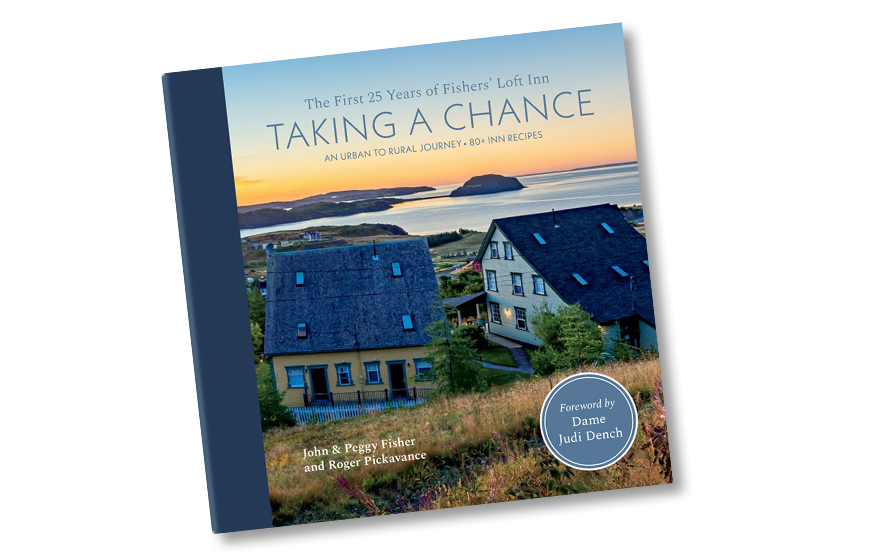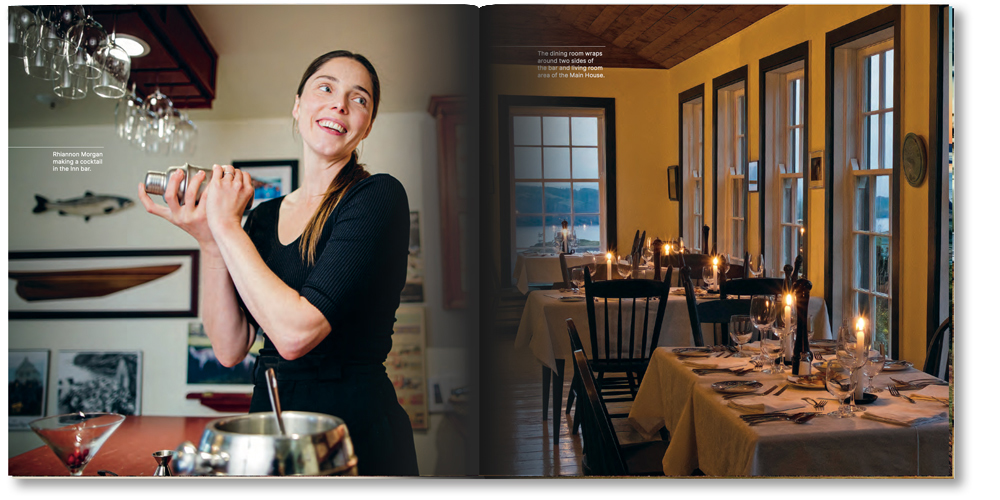Account Login
Don't have an account? Create One

“The very worst day…,” he begins, recounting a tale also touched on in Taking a Chance: The First 25 Years of Fishers’ Loft Inn, a book written with his wife and business partner Peggy Fisher.
The very worst day, he continues, came after they made the move from Peterborough, O.N. to Port Rexton with sons Luke and Gabe in 1989. It came after the time they’d taken on some overflow from a local B&B. It came after they’d joyfully made more friends in the area, built an addition to their house, and opened the Fishers’ Loft, quickly expanding. They added two buildings to their property, reaching to 12 rooms in total.
“We’re doing fine and we’re just having a lovely time and then suddenly we find we’re just completely out of water,” he recalls.
They weren’t aware of a slow leak from new toilets, draining an underground well and even the fissures feeding it. “It’s the biggest disaster going when you’re running an inn and you have no water,” he said.
They were forced to close for a week, in what he described as “rather dramatic business.” But it was a milestone, looking back.

“I think that was kind of the worst day and the biggest learning day. We learned there are no alibis in this business. People who are paying money have expectations. You’ve got to meet those expectations. Don’t whine and excuse yourself or anything. Meet those expectations. And that’s what we’ve done. In a very business-like and very hard-nosed kind of a way,” he said.
The Fishers added three additional wells since the water debacle, back-up storage tanks, pipes, pumps and digital sensors, allowing them to closely track the water available to their different inn buildings, and move water around. It’s an impressive amount of infrastructure for the area.
With continued re-investment over the years, Fishers Loft Inn grew and now includes six guest buildings, 33 rooms, conference centre, library/sitting area and bar together with additional service structures like the pumphouse and greenhouse. The company has a dedicated roster of full-time and part-time employees to manage it all through each tourism season.
Fisher doesn’t like the word “founder,” or anything he senses as the slightest bit aggrandizing. In part, it’s because neither he nor his wife enjoy being talked about like they’re somehow separate from other business owners, though the inn has survived longer than many. Really, it has become part of the bedrock of the Newfoundland and Labrador hospitality and tourism industry. The couple’s interest in the arts has meant foundational ties to the literary journal Riddle Fence, the Bonavista Biennale, artist residencies and annual photography exhibitions and more.

Even so, and this is tied to their shunning of pedestals, the Fishers very much believe that if there is any trick or rule for success (besides having plenty of water), it is to be found in the mix of talent and skills in the people around you.
“You pick up all kinds of credit that you’re very clever and visionary when actually you don’t really know what you’re doing—but you’ve rounded up the right crowd of people,” Fisher said.
Apart from their own story, their book includes feature profiles of some of the people who helped literally build the inn and its contents, like furniture maker Mike Paterson, or artist and home designer Frank Lapointe. They also feature friends who have otherwise contributed to their success through the years, like filmmaker Barbara Doran, musician Pamela Morgan, even lawyer John O’Dea.
Photography from throughout the inn property shines, like Dennis Minty’s cover and beautiful landscapes but also a mix of others, particularly profile shots by Candace and Dru Kennedy. Images of the feature profile subjects have a particularly inviting warmth about them. This coffee table book isn’t smattered with unnamed staff either. You’ll see Michelle Avery in a room changing the linens and Magan Hiscock at the clothesline.
“All of those people were absolutely integral to what we’ve pulled off here,” Fisher said, when asked about the profiles and acknowledgements.
On the subject of employees, he says anyone who wants to survive in hospitality, or in any “personal contact industry,” needs to take the importance of careful staffing very seriously. He also recommends building up your management structure, delegating, stepping back where you can, if you really want to survive.
“If you are the owner of a business and you’re constantly on the front lines, you’re going to burn out. You won’t sustain it. It’s impossible,” he warned.

It was a conscious decision by the Fishers to stretch financially in the early years, to rapidly scale up the inn’s capacity, to fulfill a desire not to be overtaken. “Because we still have to create and do innovative and fresh and new things and you won’t do those things (A) if you’re not making any money and (B) if you’re tired and burned out,” he explained.
Today, the Fishers’ sons lead daily operations with a level of shift management below them. And Fisher said all staff are used to being relied on. In turn, they are assured of “a really good staff rotation,” featuring “lots of time off” even in season, with mid-season bonuses, he said.
He admits going online with reservations, with a provincial cultural event in their area of the province (the Cabot 500) just as they were starting out, connecting to film productions in the Random Passage miniseries and the filming of The Shipping News were all strokes of luck that helped make it all work.
A connection made with Dame Judi Dench during filming of The Shipping News was tapped more recently, as Dench agreed to a foreword for the book. Among other things, she recalls spending time in the inn’s kitchen.
The book offers recipes from that kitchen, selected by chef Roger Pickavance, who dedicated his work as a researcher to Newfoundland cuisine.
The kitchens, celebrities, staff, artists… With everything that’s happened, Fisher still has no trouble remembering his best day, even if he doesn’t recall the exact date.
“The best day is when you suddenly realize you’ve got 34 staff who seem happy and contributing and you have 12,000 people who go through here in six months and I think the realization of that was our best day. We realized we’d actually built a sustainable, working enterprise that created good jobs,” he said. And that’s something to celebrate.
More Book Reports:
In Book Report, Atlantic Business Magazine highlights non-fiction focused on Atlantic Canada and Atlantic Canadians, and from Atlantic Canadian publishers. These short pieces offer details from upcoming business biographies, Q&As on new releases and in some cases fresh commentary from non-fiction authors on the subject of their published works.
Comment policy
Comments are moderated to ensure thoughtful and respectful conversations. First and last names will appear with each submission; anonymous comments and pseudonyms will not be permitted.
By submitting a comment, you accept that Atlantic Business Magazine has the right to reproduce and publish that comment in whole or in part, in any manner it chooses. Publication of a comment does not constitute endorsement of that comment. We reserve the right to close comments at any time.
Cancel
Notifications